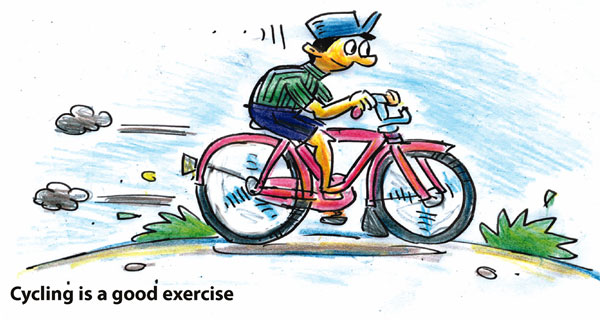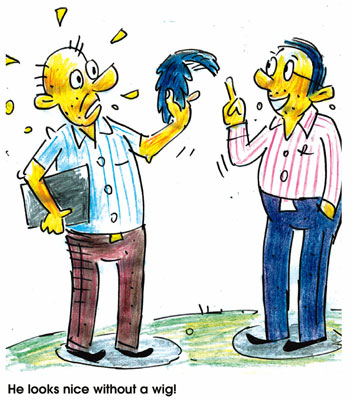|

by R. S. Karunaratne
The use of adjectives
[Part 2]
We use plural verbs with some adjectives that behave as nouns.
The young have a very strong team spirit.
The homeless were given temporary accommodation in school buildings.
The injured have been rushed to the hospital.
The handicapped do not receive adequate public support.
The guilty were sentenced to rigorous imprisonment.

Note: When adjectives are used as nouns they are preceded by 'the.'
We use singular verbs with 'ing' verb forms that behave as nouns.
Cycling is a good exercise.
Labelling of canned food is done by female workers.
Cooking takes a great deal of time.
Solving crossword puzzles is an interesting hobby.
Bullying freshers at universities is a deplorable form of behaviour.
We use singular verbs with expressions of distance, money, time and
weight if they refer to a single sum or quality.
Rs 50,000 has been spent to renovate the building.
Seven hours of sleep is necessary for a healthy person.
Two miles is not a long way to go to school.
Rs 100,000 was stolen from the bank.
At least two hours is needed to complete the assignment.
Word order
The order of adjectives depends on their meaning. We usually use
adjectives in the following order:
1. Opinion (beautiful, slow, nice)
2. Size (large, small, long, short, tall)
3. Quality (famous, soft, angry)
4. Age (new, old)
5. Colour (blue, green, white)
6. Origin (Swedish, French, Indian)
7. Material (plastic, gold, silver)
8. Type (as electric kettle, a political appointment)
9. Purpose (a bread knife, a bath towel)
Adjective pairs
A film can be 'interesting, boring, exciting' or 'amusing.'
You can feel 'interested, bored, excited' or 'amused.'
More examples
The teacher told us an amusing story.
The students were amused by the teacher's story.
The train delay was annoying.
The passengers were annoyed by the train delay.
The lecture was boring.
The students were bored by the lecture.
The lecturer gave some confusing instructions.
The students got confused by the lecturer's instructions.
The wet weather can be depressing.
The wet weather makes us depressed.

The cricket match was exciting.
The spectators were excited.
[Activity]
Put the adjectives in brackets in the correct order and check your
answers with the key.
1. The boy was fascinated to see a .............. insect. (green,
small)
2. My sister is using a ................ cream. (face, new, wonderful)
3. We were tired after a ............... journey. (train, boring, long)
4. Do you like this ............. frame? (picture, wooden, beautiful)
5. Father bought an ................ basin. (sugar, antique, silver)
6. I bought a .................. vase. (glass, old, lovely)
7. There is an ................ mirror in the bathroom. (wall,
attractive)
8. I was given a ............... desk. (modern, office)
9. We bought six ............... chairs. (kitchen, red, metal)
10. Grandmother has a ................... table. (small, coffee, wooden)
Key:
small green 2. wonderful new face 3. long boring train 4. beautiful
wooden picture 5. antique silver sugar 6. lovely old glass 7. attractive
wall 8. modern office 9. red metal kitchen 10. small wooden coffee
Starters:
How to use prepositions
[Part 26]
There are over 100 prepositions in English. This is a very small
number compared with the vast number of nouns, verbs and adjectives.
However, most beginners find it difficult to use prepositions correctly.
This is a guide for them.
[With]
Some adjectives are usually followed by 'with':

adorned, awash, bursting, caked, clogged, cluttered, covered,
crowded, draped, edged, embellished, emblazoned, embroidered, encrusted,
engraved, festooned, filled, flecked, furnished, heaped, heavy,
infested, inlaid, inundated, laden, littered, loaded, ornamented,
overgrown, overloaded, packed, padded, painted, patterned, peopled,
piled, rich, riddled, studded, stuffed, suffused, swamped, teeming,
thick, tinged, wreathed
We can be pleased or angry 'with' somebody or something.
People get angry with me when I criticise them.
Here are some more adjectives expressing feelings followed by the
preposition 'with'.
angry, annoyed, bored, content, disappointed, displeased,
dissatisfied, fascinated, fed up, furious, happy, impressed, infatuated,
obsessed, pleased, satisfied, unhappy, unimpressed, dissatisfied
We use 'with' to indicate a state, quality or action.
As I am familiar with the banking procedure, I can do this job easily.
The company does not recruit anyone connected with drugs.
Most children are careless with money.
Here is a list of similar adjectives followed by 'with':
acquainted, afflicted, commensurate, comparable, compatible, confronted,
connected, consistent, conversant, engaged, faced, familiar, frank,
free, friendly, identical, impatient, incompatible, inconsistent,
infected, intoxicated, involved, mixed up, occupied, parallel, patient,
popular, unacquainted, unconnected, unfamiliar
If you part 'with' something, you no longer need it.
I want to part with this old exercise bicycle.
If you 'side with' somebody or something, you support them.
All the ministers will side with the government against the No
Confidence Motion.
If you say you are with somebody, you understand their position.
In this situation, we are with you.
[Within]
The preposition 'within' means 'inside or not further than an area or
period of time.'
The medicine should be taken within a week.
He managed to complete his novel within a year.
I know that my goal is within reach.
Make sure you are acting within the law.
The books within the library are usually arranged according to subject.
An event can take place within a particular period of time.
It started raining within a matter of a few minutes.
If something is 'within sight', you can see it.
If something is 'within earshot', you can hear it.
If something is 'within reach', you can reach it.
[Without]
The preposition 'without' means 'not having or lacking something.'
Oh, I have come without my umbrella.
He looks nice without a wig!
This is without a doubt the best private university.
You should not watch television for a long time without taking a break.
You can do something 'without' a feeling.
He described the accident without any feeling.
[Worth]
If something is worth a particular amount of money, it can be sold
for that amount.
The house is worth Rs 10 million.
If something is worth a particular effort or activity, it will be
useful or interesting.
The Sigiriya frescoes are worth seeing.
[Activity]
Fill in the blanks with suitable prepositions and check your answers
with the key.
1. Most girls are quick ......... learning languages.
2. The refugees are readjusting themselves ......... normal life.
3. Shirani bears a strong resemblance ..... her mother.
4. He resigned .......... a government job to be a journalist.
5. There is a long-standing US embargo ......... trade with Cuba.
6. He is toying .......... the idea of taking to politics.
7. The trouble .......... Mary is that she never listens to anyone.
8. The management is unhappy .......... the performance of new recruits.
9. She always twiddle ........... her hair.
10. Public opinion turned ............ the new candidate. Concluded
Key:
1. at 2. to 3. to 4. from 5. on 6. with 7. with 8. with 9. with 10.
against
Form adjectives from nouns
Words often come in families. You can expand your vocabulary by
becoming familiar with these word families. In the following quiz fill
column 'B' with adjectives for the nouns in column 'A" and check your
answers with the key.
Column A Column B
1. System ...............
2. Talk ...............
3. Taste ...............
4. Tax ...............
5. Teaching ...............
6. Tear ...............
7. Technique ...............
8. Technology ...............
9. Thanks ...............
10. Theory ...............
11. Thickness ...............
12. Thinness ...............
13. Thirst ...............
14. Threat ...............
15. Tightness ...............
16. Time ...............
17. Tiredness ...............
18. Title ...............
19. Top ...............
20. Touch ...............
21. Toughness ...............
22. Tradition ...............
23. Training ...............
24. Treatment ...............
25. Trick ...............
Key:
1. systematic 2. talkative 3. tasteful 4. taxable 5. taught 6.
tearful 7. technical 8. technological 9. thankful 10. theoretical 11.
thick 12. thin 13. thirsty 14. threatening 15. tight 16. timely 17.
tired 18. titled 19. top 20. touchy 21. tough 22. traditional 23.
trained 24. untreated 25. tricky |


